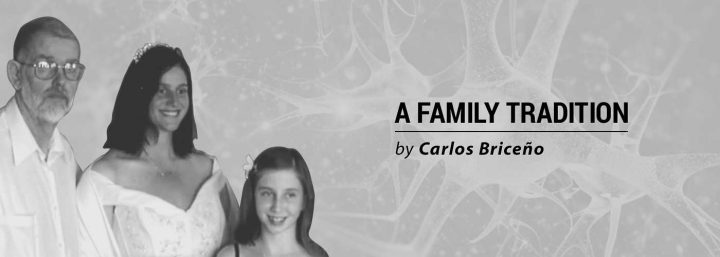The Enduring Positivity of Huntington’s Patients and Families

Ever since my wife, Jill, and our daughter were tested and diagnosed as gene positive for Huntington’s disease, I have been impressed with their positive attitudes and outlook for their future. Today I realized their attitudes are the long-standing views of their family.
I realized this after Jill spoke to a family member who also was recently diagnosed with Huntington’s. The conversation revolved around how Jill and her family member both decided to make the best of bad circumstances after their diagnoses. They sought treatment not only for themselves, but also for their families. They understand that they aren’t the only ones affected by their diagnoses, and family members suffer with them.
They wanted to deal with the symptoms and their mental health head-on. Knowing that medications would help alleviate some of their issues, they both worked to find the right options for them.
When someone receives a positive Huntington’s diagnosis, their children have a 50% chance of receiving the same news one day. A significant other, immediate family members, and friends all know the person they love will face a steady physical and mental decline. They know that one day, they may have to take care of their loved one. It isn’t easy for anyone involved.
Because Huntington’s is a genetic disease, those who are diagnosed often know what lies ahead in their future, because they have witnessed a parent or relative with the disease. Jill witnessed her father’s slow decline and eventual death because of Huntington’s, yet she chooses to believe that her future will be different, that our daughter’s future will be different. She believes there will be treatment and possibly a cure before they will have to suffer like her father.
Jill is not always sunshine and rainbows about her diagnosis. She has days when she is worried about our future. She has days when she is angry or sad about having the disease. But those down days are rare, and she’s remarkably resilient.
This is where the positivity I mentioned earlier comes into play. She and many members of her family believe there may be a cure in their lifetimes, and they participate in trials and studies to make sure it happens. Some might say this is denial, and the present is bleak without a cure. But knowing Jill, and knowing the conversations she has had with other family members, I am certain that even if a cure isn’t found for her, her openness to participate in trials or studies may pave the way for a cure in the future.
This is such a brave mindset — she’s turning the word “positive” in the phrase “gene positive” into something radically inspiring rather than depressing.
I am sad that Huntington’s is now a part of my family’s life, but if the rest of the Huntington’s community has a fraction of the drive to find a cure that Jill’s family has, one day Jill will be able to tell her great-grandchildren all about it.
***
Note: Huntington’s Disease News is strictly a news and information website about the disease. It does not provide medical advice, diagnosis, or treatment. This content is not intended to be a substitute for professional medical advice, diagnosis, or treatment. Always seek the advice of your physician or other qualified health provider with any questions you may have regarding a medical condition. Never disregard professional medical advice or delay in seeking it because of something you have read on this website. The opinions expressed in this column are not those of Huntington’s Disease News or its parent company, Bionews, and are intended to spark discussion about issues pertaining to Huntington’s disease.







Leave a comment
Fill in the required fields to post. Your email address will not be published.